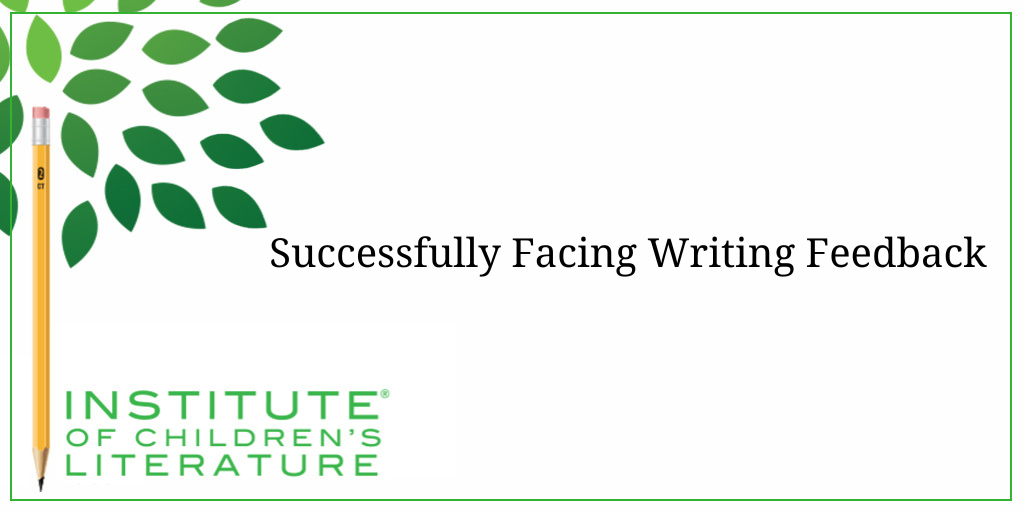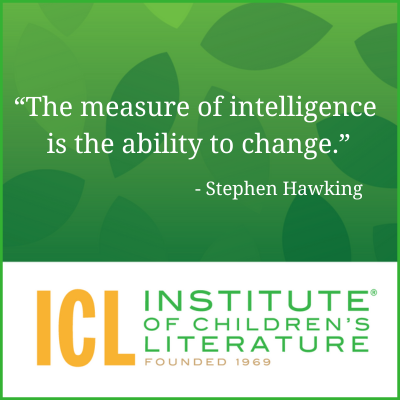
5 Ways Writers Can Prep for 2025 Goal Setting
Before we roll on to the new writing year, let’s harness our optimism for the blank slate before us and prepare for our 2025 Goal Setting just for writers.
Beginning Tuesday, July 22, 2025 at 10 PM CT through Wednesday, July 23, 2025 at 4 AM CT, we will be performing scheduled maintenance to update our website.

One of the things many writing classes offer is feedback. As I write this, I’m preparing materials to teach an in-person writing workshop. The workshop will involve one-on-one writing feedback for the attendees. It’s the same sort of thing I did as an Institute instructor, only in person.

Taking on anything uncomfortable can trigger unhelpful behaviors, which makes it worthwhile to make a plan for facing feedback. The plan will help you deal with writing instructors, critique groups, and editors. There’s no point in your career where you will stop getting feedback. The skills you build now will be called upon over and over in the days and years to come.
Whether you’re in a situation where you are getting writing feedback in person or through written remarks on your work, the first thing is simply to read or listen to the feedback without comment. It’s natural for your brain to immediately begin to rally arguments about why you did something or why your choice was right. This is unproductive, so push this response aside as best you can.
You want to hear or read what is actually being said, not your reaction to what is being said. Giving in to the urge to react at this point will make you miss things. I promise it will. It’s done that for me. It’s done it for every writer you’ve ever known. Writers can be as temperamental as any other artistic person and that can mean we get stirred up by criticism. But the more we can set aside that defensiveness, the better we can process what we’ve been told.
This tendency to react is so universal that most in-person critique groups have a rule that you cannot interrupt someone giving you a critique and you cannot defend yourself. That rule isn’t there to make your life worse. It’s there to encourage you to push aside those kinds of emotionally charged reactions and better understand the writing feedback being offered. Knee-jerk reactions will always be unhelpful because they are at least partly based in defensiveness.
Think of the times you tried to tell a friend something constructive they needed to hear, but probably didn’t want to hear. How many times have people insisted you said something that you didn’t really say? That comes from this emotional defensiveness. It’s natural, but it’s frustrating for the person trying to help and blocks the receiver from gaining the help they might need. One of the first things you can do to improve your response to feedback is to practice active, mindful listening that pushes aside emotional responses in favor of consuming information accurately. Listen. Take notes. And don’t respond right away.

Giving yourself time will be hugely helpful in not burning your bridges. This can be especially important in face-to-face feedback. When you give in to reacting to the feedback immediately, you can frustrate the person trying to help you because you aren’t listening, you’re building arguments. And if you frustrate people who want to help you enough, they lose interest in your success. You’ll end up with the person thinking, “Fine, do it your way. See how that turns out.” Don’t make people quit on you. Take the time you need to detach the emotional defensiveness from the value available in learning those things you need to correct.
Once you’ve given yourself time to process the feedback in a logical way, you can begin to evaluate whether it’s feedback that will be helpful. Not all directions need to be followed to the letter. Not all feedback is accurate. Ultimately only you can decide if the feedback you receive has helped. Keep in mind that most feedback is helpful, at least in part. I’ve received feedback that was incorrect but still helped draw my attention to a portion of the work that was confusing the reader and making them come to an incorrect conclusion. The conclusion wasn’t accurate, but it accurately pointed to a problem. Thus, even if you’re certain the person giving you feedback is wrong about a specific instance, try to figure out why they made the assumption they made.
For example, I once wrote a story about a family whose last name was Sparkle. I liked the sound of the word “Sparkle,” and I thought it would make a funny last name for an ordinary main character. Unfortunately, the choice resulted in reader confusion. Because the reader age was quite young (it was meant to be a read-aloud), the person giving me feedback assumed Sarah was meant to be a sentient sparkle and that ruined the person’s understanding of everything in the story. Now in a published piece, there would be illustrations that kept the intended readers from mistaking little Sarah’s identity, but if the text is unclear without the illustrations, then it’s potentially going to be unclear for acquiring editors. I needed to eliminate that possible mistake before moving on with the story. Had I dismissed the feedback out of hand because it was based on a misreading, I would have run the risk of future misreadings ruining the story’s chance of publication.
Responding to feedback is complicated. As mentioned earlier, defensiveness is natural but unproductive. The first thing to do is to check that your responses don’t drag defensiveness into your communication. That doesn’t mean a response isn’t appropriate.

Anyone giving you feedback is giving you a piece of their time and skills that took that person years and years to hone. Maybe you don’t like what they said, but the fact that they said it at all is amazing. The writing life will present you with lots and lots of opportunities to send something off, hoping for publication, and ending with no feedback at all. You don’t make the sale and you have no idea why. That can leave you feeling like you’re flailing around and unsure how close you’re getting to success. So, when someone does give you feedback, any feedback, respect it and the person’s time and respond with the gratitude it deserves. Plus, quite frankly, everything about your writing life will improve if you cultivate gratitude. You’ll be seen by editors as easier to work with. Your emails won’t be ignored. And readers will love you.
Once you’ve responded with gratitude, the next acceptable response is questions. You may not understand the terminology used in the feedback. You may not be certain what the person means by a specific remark. In that case, don’t hold back on asking questions. I’ve seen writers take in feedback, misinterpret it, and then make their work worse instead of better. Don’t be afraid to ask questions fearlessly. Ignore the tiny voice that doesn’t want you to admit you don’t know something. Speak up, ask questions, get clarity. If your questions aren’t coated by defensiveness, they’ll help you move forward.
Now, sometimes a question would be answered if you reread your assignment materials. Sometimes you simply miss things. Or a question might be answered with a quick web search. Say, you got feedback saying “SDT” and you’re not sure what that means. When I type “What does SDT mean in creative writing?” into my search engine, the second link tells me that SDT means “Show don’t tell.” Now, SDT can mean other things but none of them make sense in a specific writing situation. When you can save time by searching for the answers to questions you had, then it’s good to do that, but when in doubt, ask. People giving feedback want you to understand. They wouldn’t go to the trouble of sharing what they know unless they wanted you to understand.

Let feedback teach you, let the lessons sink in , and change your writing for the better. You don’t have to accept everything you’re ever told. In fact, you probably shouldn’t. But when you get feedback you recognize as valuable, watch for ways to put it to use in the future. By not continuing to make the same mistake over and over after receiving feedback about it, you grow as a writer. And you increase your chances of publication success in the future.
That’s the purpose of feedback. That’s why we seek it out. We want to be more successful, and feedback can help take us there, but only if we respond to it correctly.
So, whenever feedback is a bit uncomfortable, keep your eye on the prize of eventual success, and you’ll find it helps get you there.
With over 100 books in publication, Jan Fields writes both chapter books for children and mystery novels for adults. She’s also known for a variety of experiences teaching writing, from one session SCBWI events to lengthier Highlights Foundation workshops to these blog posts for the Institute of Children’s Literature. As a former ICL instructor, Jan enjoys equipping writers for success in whatever way she can.

Before we roll on to the new writing year, let’s harness our optimism for the blank slate before us and prepare for our 2025 Goal Setting just for writers.

Writers can be thin-skinned when it comes to getting feedback on their work. Let’s look at 4 ways to positively deal with constructive criticism!

Rejection is part of the territory when it comes to being a writer. Today we offer reflection for writers to help redirect your efforts after a rejection.
1000 N. West Street #1200, Wilmington, DE 19801
© 2024 Direct Learning Systems, Inc. All rights reserved.
1000 N. West Street #1200, Wilmington, DE 19801
© 2024 Direct Learning Systems, Inc. All rights reserved.
1000 N. West Street #1200, Wilmington, DE 19801
© 2024 Direct Learning Systems, Inc. All rights reserved.
1000 N. West Street #1200, Wilmington, DE 19801
© 2025 Direct Learning Systems, Inc. All rights reserved.
1000 N. West Street #1200, Wilmington, DE 19801
©2025 Direct Learning Systems, Inc. All rights reserved. Privacy Policy.
4 Comments
Should you always be silent and not speak up? Or are there occasions when it is ok to clarify what you meant? What if the feedback is harmful and misrepresentative of what you wrote and interpreted in a negative way?
Hi Ann. If the feedback is from an editor/publisher with whom you are working, then sure, you can try to clarify with the goal of fixing the piece so that it doesn’t lead to that kind of misreading. And sometimes errors happen when someone simply read too fast or was too distracted while reading, but even misrepresentative feedback is caused by something and you’ll want to figure out what that is. Is it something in the writing that made it easy to mistake your meaning? Is there a better, clearer way to write the scene/speech/character to lessen the likelihood of readers making that kind of mistake? And any “bad” feedback needs to be addressed from the viewpoint of “Thanks for helping me see how this is coming across. That’s not what I meant to say, can you help me see why it comes across that way?” rather than direct confrontation. If the only way you can respond is direct confrontation, then you have to weigh whether is ANY benefit from the confrontation, knowing that whatever you say is unlikely to make it better. Because people who misinterpret tend to respond defensively if called on it and often double down. Will it help the situation if that is the result?